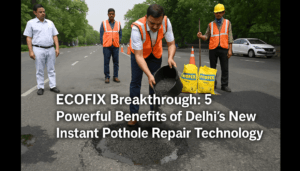ECOFIX Breakthrough: 5 Powerful Benefits of Delhi’s New Instant Pothole Repair Technology
The Delhi Public Works Department recently carried out a successful live trial of ECOFIX, a new instant pothole repair technology, on the Delhi Secretariat Road. Developed by CSIR-CRRI in collaboration with a startup, ECOFIX uses steel slag, an industrial byproduct, to create a ready-to-use mix for quick road repairs. The demonstration showed the technology’s ability to fix both dry and water-filled potholes without dewatering, with roads ready for use within 15 to 20 minutes.
This innovation is cost-effective, durable, and supports environmental sustainability by reducing dependence on natural resources. PWD Minister Parvesh Verma emphasized that this initiative is part of the government’s push for safer, pothole-free roads. He highlighted that it also reinforces public trust by ensuring timely repairs before the monsoon. The implementing agency will be responsible for maintenance of the repaired patches for the next two and a half years. The technology aligns with the ‘Waste to Wealth’ vision, offering a green solution to urban infrastructure challenges.

ECOFIX Breakthrough: 5 Powerful Benefits of Delhi’s New Instant Pothole Repair Technology
The Delhi government’s Public Works Department (PWD) recently trialed an innovative, eco-friendly solution to fix potholes, achieving promising results. On Saturday, the department tested a new method called ECOFIX on Delhi Secretariat Road, using steel slag—a waste material from steel manufacturing—to repair damaged sections quickly and efficiently. The trial, supervised by PWD Minister Parvesh Verma, showcased how this technology could transform road maintenance, especially during the monsoon season when waterlogged potholes disrupt traffic and endanger commuters.
During the demonstration, teams from the CSIR–Central Road Research Institute (CRRI) and a collaborating startup repaired both dry and water-filled potholes without needing to drain the water first. This feature is a game-changer, as traditional methods often delay repairs until the water is removed, prolonging road hazards. With ECOFIX, the material bonds effectively even in wet conditions, allowing roads to reopen to traffic within 15–20 minutes. This rapid curing time minimizes traffic snarls and offers a practical solution to Delhi’s persistent pothole problem.
The key ingredient in ECOFIX is steel slag, a byproduct of steel production that would otherwise end up in landfills. By repurposing this industrial waste, the method not only reduces reliance on natural resources like gravel but also addresses environmental concerns. Satish Pandey, the CRRI scientist who developed the technology, emphasized its cost-effectiveness and durability. “Unlike conventional materials, ECOFIX is designed to last longer and withstand heavy traffic,” he said. “It’s a win-win: we’re recycling waste while building stronger roads.”
Minister Parvesh Verma highlighted how the trial aligns with the government’s commitment to safer, higher-quality infrastructure. “This isn’t just about fixing roads—it’s about restoring public confidence and prioritizing sustainability,” he stated. With monsoons approaching, the timing is critical. Potholes often worsen during heavy rains, leading to accidents and costly repairs. ECOFIX’s ability to work in wet conditions could drastically reduce these risks, ensuring smoother, safer commutes year-round.
Another standout feature of the initiative is its accountability framework. The agency responsible for repairs will also maintain the roads for two and a half years, ensuring quality isn’t compromised after the initial fix. This long-term approach aims to break the cycle of temporary patches and recurring potholes—a common frustration for Delhi’s residents.
Officials also connected the project to Prime Minister Narendra Modi’s “Waste to Wealth” mission, which promotes converting industrial byproducts into valuable resources. By turning steel slag into road repair material, ECOFIX embodies this vision, offering a scalable model for other cities. If adopted widely, the technology could reduce landfill waste from the steel industry and cut construction costs, creating a ripple effect of economic and environmental benefits.
The successful trial has sparked discussions about expanding ECOFIX across Delhi. PWD officials are evaluating its performance in diverse conditions, such as high-traffic zones and areas prone to waterlogging. If rolled out citywide, the method could modernize Delhi’s road maintenance strategy, setting a precedent for sustainable urban development.
Residents and commuters have long demanded reliable solutions to the city’s pothole crisis, which damages vehicles, disrupts daily life, and poses safety risks. ECOFIX’s quick application and durability could address these pain points while aligning with global sustainability goals. Moreover, by involving startups and research institutes like CRRI, the project fosters innovation and public-private collaboration—a crucial step for tackling complex urban challenges.
In summary, the ECOFIX trial represents more than just a technical breakthrough. It reflects a shift toward eco-conscious governance, where waste becomes a resource and public infrastructure projects prioritize longevity, efficiency, and environmental stewardship. For Delhi, a city grappling with rapid urbanization and climate pressures, such innovations are essential to building resilient, citizen-friendly infrastructure. As the PWD explores wider implementation, ECOFIX could pave the way for a future where pothole-free roads and sustainable practices go hand in hand.
You must be logged in to post a comment.